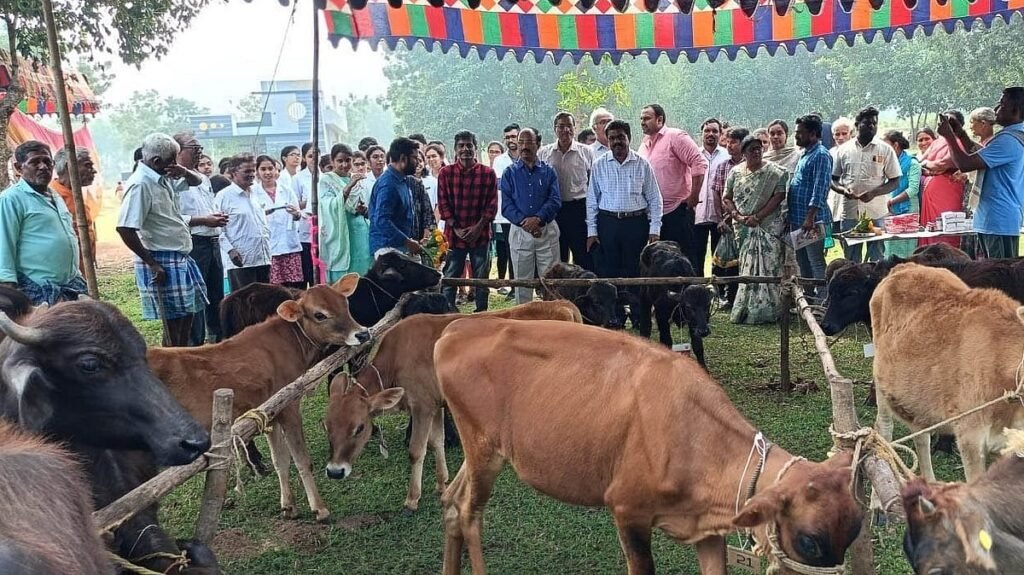Vizianagaram, June 30, 2025 | Dairy Dimension Update
In a strategic move to elevate milk production and curb the growing stray cattle problem, the Andhra Pradesh Livestock Development Agency (APLDA) is set to roll out Sex-Sorted Semen (SSS) at a 70% subsidy under the Accelerated Breed Improvement Programme (ABIP) starting July 1, 2025.
🎯 90% Probability of Female Calves: A Dairy Game Changer
Traditional artificial insemination methods yield a 50-50 gender split, often burdening farmers with male calves that serve limited economic utility in modern, mechanized farming.
In contrast, sex-sorted semen ensures over 90% probability of producing female calves—a boon for dairy farmers aiming to expand their milk-producing livestock base.
“Use of sex sorted semen will be a game changer not only for enhancing milk production but also limiting the stray cattle population,” said Dr. YV Ramana, Joint Director of Animal Husbandry, Vizianagaram.
📈 Expected Impact on Dairy Sector
Vizianagaram district currently has:
- 3.06 lakh breedable animals
- ~2.2 lakh artificial inseminations annually
- ~83,000 calves are born each year
With over 60% of livestock in heat cycle annually, the move to SSS could result in:
- A higher percentage of productive female animals
- Reduced feeding costs for economically unviable male calves
- Decreased stray cattle in urban and peri-urban spaces
💡 A Technology Backed by Gokul Mission
The initiative stems from the Rashtriya Gokul Mission, which promotes high genetic merit breeding and controlled livestock population through targeted reproduction.
SSS costs nearly ₹500 in the private sector but will now be offered at ₹150 via the Bharat Pashudhan App, following registration.
“We are targeting a 15% increase in milk production as part of the Swarnandhra 2047 vision,” added Dr. Ramana.
🧬 Why It Matters
- 🐄 Dairy Sector Efficiency: More milch cows mean better per-farm productivity
- 📉 Feed Cost Reduction: Less non-productive cattle = more efficient resource use
- 🚫 Stray Animal Control: SSS is a humane tool to manage the rural and urban stray menace
- 🧬 Breed Improvement: Genetically superior female calves boost long-term yield
As of now, over 7,000 SSS-based inseminations have been recorded in the district.
🧪 What is Sex-Sorted Semen?
Sex-Sorted Semen (SSS) is a biotechnology tool used in artificial insemination (AI) to increase the probability of birthing a calf of a specific gender, typically female in the case of dairy farming.
Here’s how it works:
- Semen is processed using flow cytometry to separate sperm cells bearing the X-chromosome (female) and the Y-chromosome (male).
- The sorted semen, rich in X-bearing cells, is then used in insemination.
- This raises the chance of producing a female calf to over 90%, compared to 50% in conventional AI.
🐮 Why is this important for dairy farmers?
- Only female cattle produce milk, making them economically valuable in dairy operations.
- Male calves, in the context of modern mechanised agriculture, are often viewed as a liability due to high feeding costs and limited utility.
- Sexed semen reduces the birth of surplus male calves, helping address the growing issue of stray cattle while boosting dairy income.
Although slightly costlier than traditional semen, its long-term economic and environmental benefits make it a highly strategic tool in modern breed improvement programmes across India.
